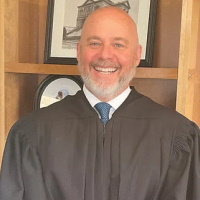
STB asks Gregory Kreis, April Van Dyke…
Ensuring the integrity and impartiality of the judicial system in Humboldt County
The Humboldt County District Attorneys office and their ability to remain fair, impartial and without bias against Defendants, Witnesses and court employees has been recently called into question. If elected, what measures would you implement to deter any question of bias or impartiality by the prosecution or any of their employees in your courtroom.
— STB
Responses

Gregory Kreis
Thank you for raising an important concern. If re-elected, I am committed to ensuring the utmost fairness, impartiality, and lack of bias in my courtroom. To address any potential questions of bias or partiality by any person in the courtroom I would continue to assert the following measures:
- Strict Adherence to Legal Standards: I would emphasize and ensure that all legal proceedings strictly adhere to established legal standards and protocols, promoting fairness and equal treatment for all parties involved.
- Clear Policies on Bias and Impartiality: Enforcing guidelines within the courtroom that explicitly address the importance of avoiding bias or partiality, and communicating these policies to all parties involved in the legal process.
- Transparency and Accountability: Promoting transparency in all proceedings and holding all court participants accountable for their actions. This includes addressing any instances of perceived bias promptly and transparently.
These measures are essential to fostering a judicial environment that upholds the principles of fairness, justice, and impartiality. If re-elected, I am dedicated to maintaining the highest standards in the courtroom to instill public confidence in the judicial system.

April Van Dyke
Thank you for this question. I apologize for my lengthy answer, but the subject of bias in the criminal legal system deserves attention.
The Supreme Court has discussed the scourge of racial bias in the criminal legal system stating, “Discrimination in our criminal justice system based on race, ethnicity, or national origin…has a deleterious effect not only on individual criminal defendants but on our system of justice as a whole…’The United States Supreme Court has also recognized ‘the impact of …evidence [of racial bias] cannot be measured simply by how much air time it received at trial or how many pages it occupies in the record. Some toxins can be deadly in small doses.”
Recently, the California legislature has passed several laws that provide judges and litigants with the legal tools to help address disparities in the criminal legal system; one such tool is the Racial Justice Act. The Act says, “[t]he state shall not seek or obtain a criminal conviction or seek, obtain, or impose a sentence on the basis of race, ethnicity, or national origin.” Case after case and study after study have exposed the disparity of sentences that people of color receive in our country. Unfortunately, Humboldt County is not immune to such disparities.
When I was an attorney with Humboldt County Conflict Counsel, I was the first lawyer in the county to bring a motion pursuant to the Racial Justice Act. I was able to compile statistics from the California prisons. What I discovered was troubling. Of all the inmates serving a life sentence from Humboldt County 24% are from our Native community. According to the last census Humboldt County’s population is 6.4% Native.
As Justice Sotomayor opined “The way to stop discrimination on the basis of race is to speak openly and candidly on the subject of race, and to apply the Constitution with eyes open to the unfortunate effects of centuries of racial discrimination.” Everyone has implicit biases that effect our perceptions and actions. The first step is to acknowledge these biases and try to account for them in the criminal legal system.
Another recent tool the legislature codified addressed discrimination when selecting jurors. The law states, “A party shall not use a peremptory challenge to remove a prospective juror on the basis of the prospective juror’s race, ethnicity, gender, gender identity, sexual orientation, national origin, or religious affiliation, or the perceived membership of the prospective juror in any of those groups.” When I was an attorney for Conflict Counsel, I litigated the disproportionate make up of a jury panel when less than 1% of the potential jurors were Native.
Unfortunately, recently the court of appeals reversed Judge Kreis for not addressing potential discrimination in jury selection. The opinion reports Judge Kreis refused to hear any argument on racial discrimination because the potential jurors were not the same race as the defendant. The Court quoted Judge Kreis, “I don’t think it’s fair to the other party to just start to kind of throw out a fishing pole to maybe, maybe, maybe when this Court doesn’t see anybody who is Filipino or matches what a Filipino may or may not look like.” The Court of appeals responded to this comment stating, “although neither of the excused jurors was identified by the court or the parties as Filipino, this is of no consequence. Section 231.7, which codifies the Batson/Wheeler principle that peremptory challenges may not be made on the basis of a prospective juror’s race, makes no mention that challenged jurors must be of the same race or ethnicity as a defendant.”
In reversing Judge Kreis’ failure to consider a potentially race based dismissal of a juror the court of appeals stated, “In short, once defense counsel made a section 231.7 motion prior to the empanelment of the alternates, expressing his belief that one of the excused jurors was Hispanic or Native American and the other was Latino, pursuant to section 231.7, the court was required to ask the prosecutor to state his reasons for excusing these two prospective jurors. The trial court did not do so. Thus, the court erred by failing to follow the proper procedure.”
In short, as a judge I can only address the issues as they are presented on a case by case basis, but I will make every effort to try to move the criminal legal system to a more equitable place.
